Managing Weight and Osteoarthritis: Exploring the Benefits of the HCG Diet

Living with Osteoarthritis can be challenging, especially when excess weight exacerbates the symptoms. If you’re looking for a weight management solution that caters to your specific needs, you might consider the HCG diet.
Let us explore the following:
- How the HCG diet can help control weight and ease the discomfort associated with osteoarthritis.
- The benefits of the HCG diet and its impact on weight management for individuals with this condition.
Understanding Osteoarthritis
Osteoarthritis is a degenerative joint disease. It primarily affects the cartilage. This condition causes symptoms like:
-Pain
-Stiffness
-reduced mobility in the affected joints
Extra weight places additional strain on the joints, worsening the symptoms of osteoarthritis.
Exploring the HCG Diet
The HCG diet combines a low-calorie meal plan with injections of the hormone (HCG). It gained popularity in the 1950s and has since been used as a weight management approach.
The diet typically restricts calorie intake to around 500-800 calories per day while receiving HCG injections.

Using the HCG Diet to Control Weight with Osteoarthritis
-
Significant Weight Loss:
The HCG diet can lead to rapid weight loss. This makes it beneficial for those with this condition.
Shedding excess pounds can reduce the stress placed on the weight-bearing joints. Thus, easing the pain and discomfort associated with this condition.
-
Lower Impact on Joints:
You can reduce the weight’s impact on your joint by following the HCG diet. With less weight to bear, the load on the joints is lightened. This leads to improved mobility and decreased pain in individuals with osteoarthritis.
-
Enhanced Mobility:
Weight loss achieved through the HCG diet can enhance mobility. It can also make your daily activities more manageable.
With reduced strain on the joints, your movement becomes easier and less painful. This allows for a more active and fulfilling lifestyle.
-
Anti-Inflammatory Effects:
The HCG diet emphasizes the consumption of whole foods, including lean proteins, fruits, and vegetables. These foods have anti-inflammatory properties that can help ease inflammation associated with osteoarthritis. Reduced inflammation may result in decreased pain and improved joint function.
-
Improved Quality of Life:
The HCG diet, when coupled with weight loss, can improve the overall quality of life if you have this condition. Losing weight and reducing the burden on the joints. This leads to increased energy levels and better sleep. It can also enhance your overall well-being.
Important Considerations
- Individualized Approach: If you have this condition, it’s essential to consult with a healthcare professional before starting the HCG diet. They can provide personalized guidance based on your specific needs and medical history.
- Long-Term Sustainability: While the HCG diet may offer short-term benefits, long-term weight management requires sustainable lifestyle changes.
Transition to a balanced eating plan that supports weight maintenance once you have completed the HCG Diet. This is crucial for managing osteoarthritis symptoms effectively.
The HCG diet can be a potential tool for weight control in individuals with osteoarthritis. By promoting significant weight loss, reducing the strain on joints, improving mobility, and offering anti-inflammatory effects, the HCG diet may help alleviate the discomfort associated with osteoarthritis.
However, it’s important to consult with a healthcare professional to ensure the diet aligns with your specific needs and goals. Remember, finding a holistic approach that includes healthy eating, regular exercise, and professional guidance is key to managing weight and effectively coping with osteoarthritis.
